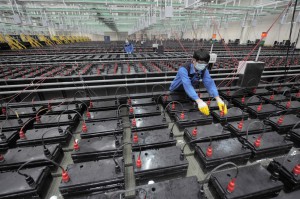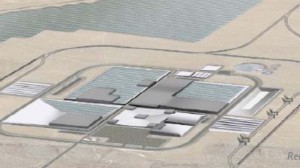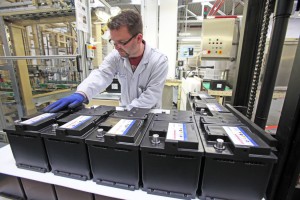Johnson Controls plans to plow almost $500 million into its automotive battery operations in North America and China to increase the output in both places to meet growing demand.
The company plans to invest $245 million to expand its plant in Mexico to produce more absorbent glass mat batteries and drop $200 million to build a new facility in China to do the same. Once complete, it’ll be JCI’s fourth plant in China.
Absorbent glass mat batteries are technologically advanced car batteries that are more expensive than conventional lead acid batteries. However, they handle the strain of frequent engine restarts and the ever-increasing electrical load placed on car batteries better. They’re frequently used on start-stop-equipped vehicles.
JCI said it plans to invest a total of $780 million globally by 2020 to expand production of absorbent glass mat batteries. It may not be soon enough.
Automakers are expanding the amount of technology is stuffed into vehicles and those features require power and lots of it. The most obvious push these types of batteries is in start-stop technology. Once considered an unreliable technology, makers at all levels have revisited its fuel-saving benefits and largely perfected it.
In addition to fuel economy improvements, which range from 3% to 12%, according to Edmunds, depending upon the vehicle and driving conditions, the technology also cuts carbon dioxide emissions from vehicles. Ford did not offer up any fuel savings estimates.

The expected growth of start-stop technology is forcing battery makers to ensure they can meet the demands for batteries that can power those technologies.
(Volkswagen readying to build and EV battery gigafactory. For more, Click Here.)
Mercedes intends to make Stop-Start technology a standard feature on its passenger vehicles, officials noted recently. It will also roll out new 48-volt onboard power supplies to enhance the function of mild hybrid technology.
Other makers are on board across their line-ups. Ford plans to use it on extremely popular EcoBoost-powered F-150 full-size pickups as well as other models such as the Escape. General Motors adopted the technology for its Chevy Impala and Malibu models as well as its new GMC Acadia crossover and European vehicles of all sorts come similarly equipped.
Originally developed for use in hybrid vehicles, the concept is rapidly being rolled out on everything from minicars to high-performance luxury vehicles and is becoming the norm, rather than the exception, over the next decade.
“The challenge for automakers is to get the biggest efficiency benefits from the smallest cost increment,” said David Alexander, senior analyst with Navigant Research.
The consultancy believes the number of vehicles equipped with start-stop technology will grow from 8.8 million to 55.4 million worldwide by 2022. Based on industry estimates, that would account for more than half of all vehicles produced that year.
In fact, start-stop technology represents the next growth market for battery makers, according to JCI. Officials told investors that they expected the technology to be in use in 60% of vehicles by 2020. It is in less than a quarter of vehicles now.
In China, Johnson Controls is forming a joint venture with Binzhou Bohai Piston, an auto parts affiliate of Beijing Automotive Industry Group. The new battery plant in China will be built and operated by that joint venture Binzhou, Shandong Province, and will eventually employ 650 people, according to USA Today.
According to JCI, 50%, or about 15 million new vehicles, will be equipped with start-stop functionality in China by 2020. JCI also predicted that China will represent 50% of all automotive battery growth over the next 10 years.
(Click Here for details about an Israeli start up developing a battery to be charged at a gas station.)

Tesla's Gigafactory is expected to help provide batteries for the maker as it reaches its production goal of 500,000 units.
The electrification of the automobile – Mercedes officials became the latest maker to suggest that all of its offerings will be electrified in the future – is causing growth in the battery-making industry on two tracks: to make the electronics run and to make the vehicle run.
Tesla’s Gigafactory, which is under construction in Nevada, was the opening salvo in the move to increase production off batteries to make the vehicle run.
Tesla said it will use the output from the factory for its vehicles as well as its other businesses. Recently Volkswagen officials said they were contemplating building an $11 billion gigafactory of its own to churn out batteries for its electric vehicles in Germany.
These projects already join market leaders Panasonic, which held a 38% share of the market by volume, at the end of 2014, according to EV Obsession, followed by AESC 23%, and LG Chem 12%. BYD, Mitsubishi-GS Yuasa and Samsung SDI rounded out the top six.
For 2015, the players remained the same, but the order changed with Panasonic remaining atop the heap with BYD moving into second and LG Chem third. AESC, Mitsubishi-GS Yuasa and Samsun SDI completed the list.
Last fall, Boston-based emerging technology researcher Lux Research Inc. predicted the market for electric-vehicle batteries will grow to $30 billion by 2020, from $5 billion last year, and predicted the three suppliers will split most of that pie, according to the Wall Street Journal.
“If we look out in a five-year time frame, we are looking at Panasonic, LG and Samsung SDI making up about 80% of the market” Cosmin Laslau, a battery expert with Lux Research, told WSJ.
NEC, which supplies batteries for the Nissan Leaf as the aforementioned AESC, could be next on the endangered battery-maker species list as its contract is up this year. No decision has been made as of yet.
(To see more about the expectations that the EV industry will grow to $60B by 2021, Click Here.)
The growth in the market stands in stark contrast to just a few years ago when JCI and A123 and other makers got out of the market because sales were so slow. Johnson Controls and A123 move to other types of batteries for automakers, such as the absorbent glass mat batteries for start-stop vehicles.


I wonder what the detriments, if any, are on “boosted” vehicles, such as the ECCO-Boost Fords, the single & twin-turbo GMs as well as other. Most times the turbos are still slightly in boost when winding down at stop lights. Hopefully they have electronically-controlled waste-gates / PRVs else they’d be in constant over-boost situations. Even at idle the impeller blades are turning at a pretty decent clip.
Also what is the start-up procedure from the start-stop sequence?
Granted I’m just nicking at the tip of the iceberg on the S-S tech on turbo cars. Let’s not even talk about S/C engines.